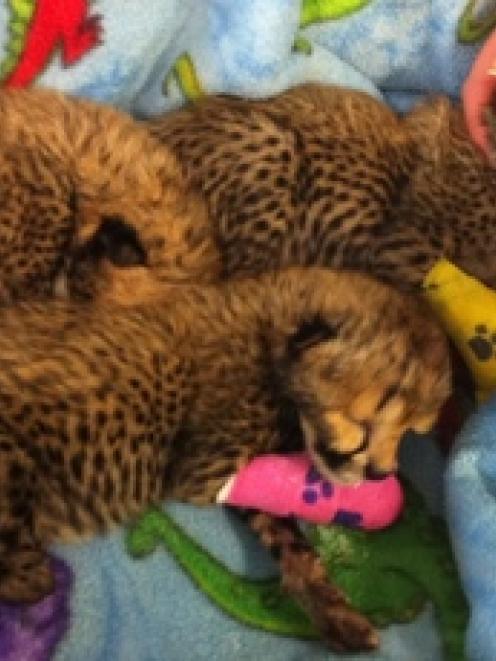
First time cheetah mother Mazza gave birth to a litter of at least five at Orana Wildlife Park on Saturday afternoon.
Zoo staff watched the births first unfold on CCTV, and think they may have seen Mazza eating two of her new babies.
They raced to the cheetah enclosure to rescue the three surviving subs.
Two more dead cubs were found later, and until CCTV footage is reviewed, zoo staff are not sure if they are the two cubs they thought were being eaten, or they are two others that Mazza gave birth to.
The surviving trio - two males and a female - are now in incubators at Christchurch's After Hours Veterinary Hospital and are being bottle-fed milk formula every hour.
Orana Park zoological manager Rob Hall says the cubs managed to survive the critical 48-hour period, and their chances of survival increases with each passing hour.
"One cub is nursing reasonably well which is great news but the other two are not feeding well at this point," he said.
"Park staff, along with the team at the After Hours Hospital, are working around the clock tending to the needs of these cats."
A necropsy report, or animal autopsy, released this afternoon said the two dead cubs died after being compromised by a complicated birth.
They hope that keeping the survivors fed with milk and keeping up their sugar levels will see them flourish.
"First time cheetah mothers can often lose their litter due to inexperience," Mr Hall said.
"Mazza was observed on camera through the birth process and did not care for the cubs, so the decision was made to take them from her.
"Two further cubs were found under a tree that was out of the camera's view and their body temperature had dropped to critical levels."
One of the veterinary nurses at After Hours Veterinary Hospital who are volunteering their time to save the cheetahs, Alyssa Holtz, said the cubs were getting better every hour.
"You can see them improving all the time, and we're confident they'll make it," she said.
Cheetah are a flagship conservation species for Orana Wildlife Park.
Only a small number of zoos worldwide have experienced repeated breeding success with the species.
To date, 18 cats have been raised to adulthood at Orana.
"Producing more cubs is a significant achievement, as cheetah are a notoriously difficult species to breed in captivity, and we're doing all we can for these precious cubs," Mr Hall said.
Mazza, 4, was also born at the park and she, along with her three brothers, was hand-raised by park staff when their mother rejected them.
- Kurt Bayer












